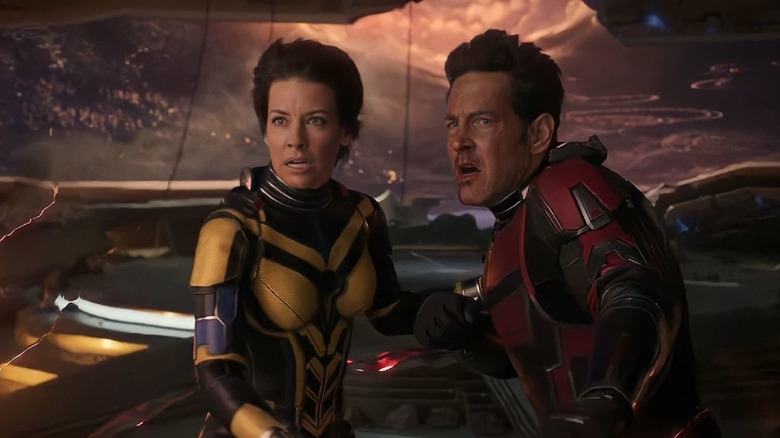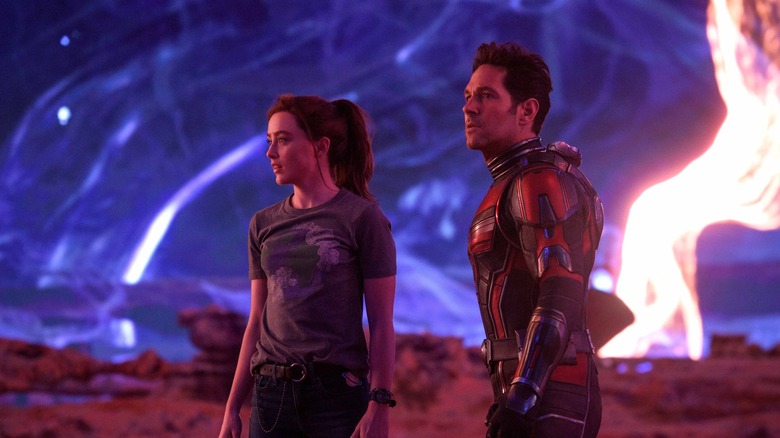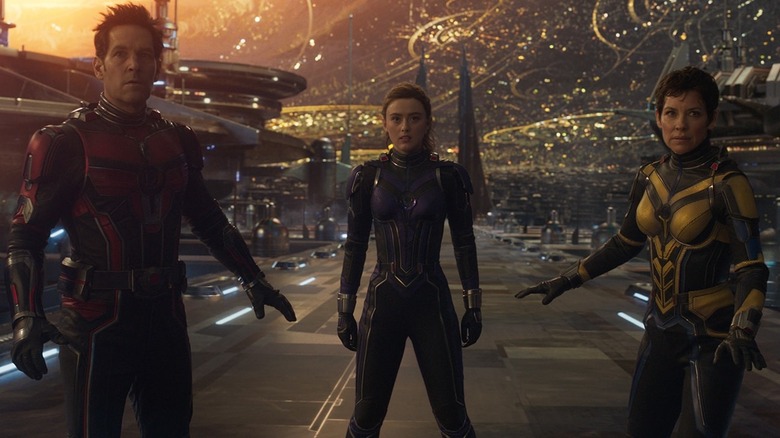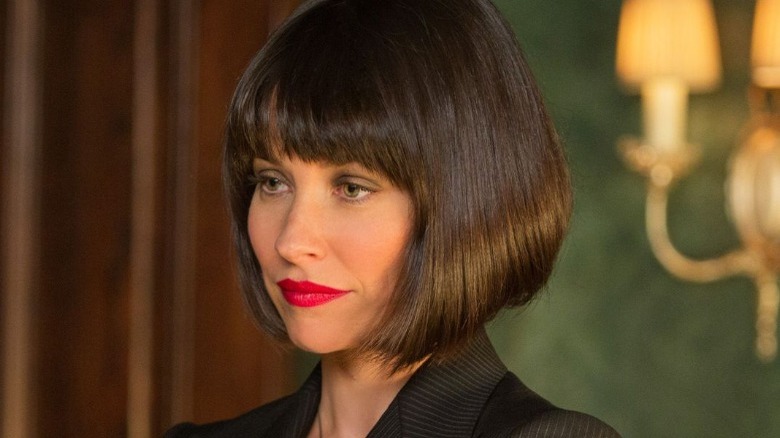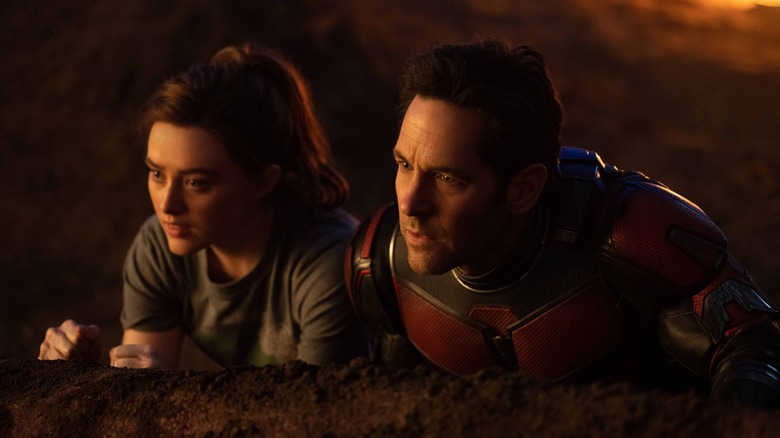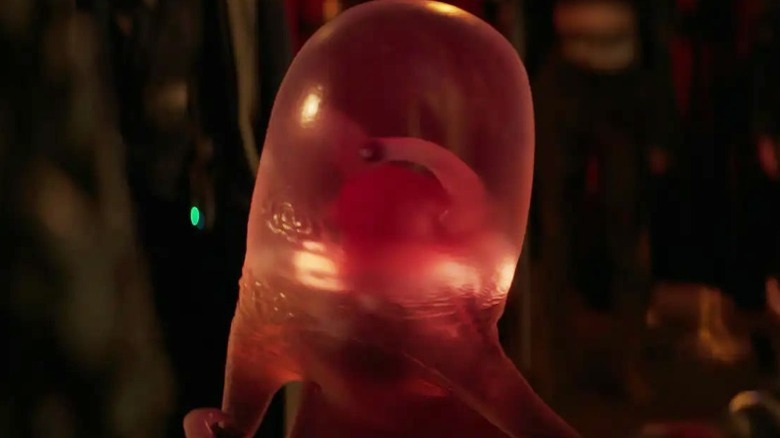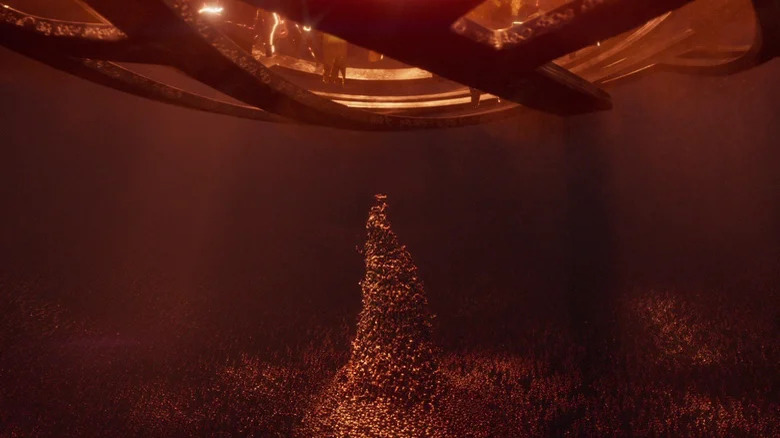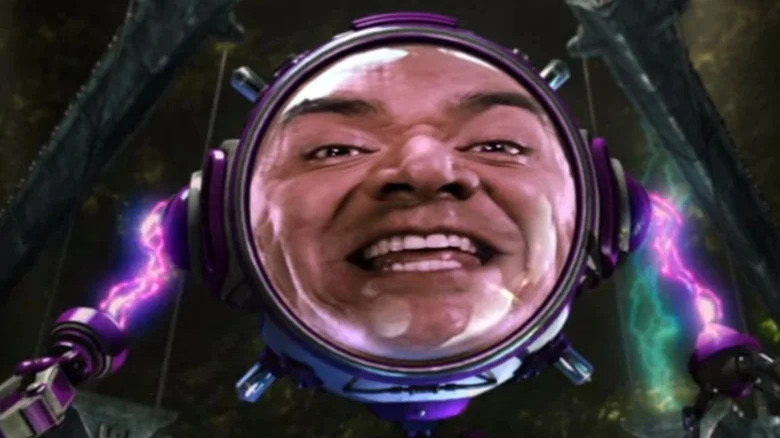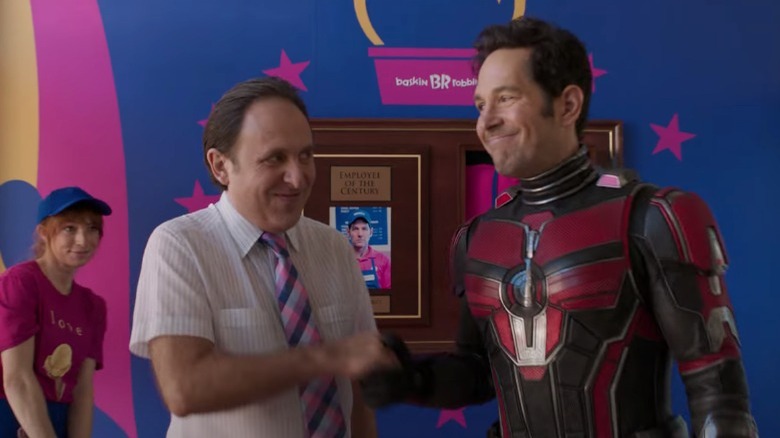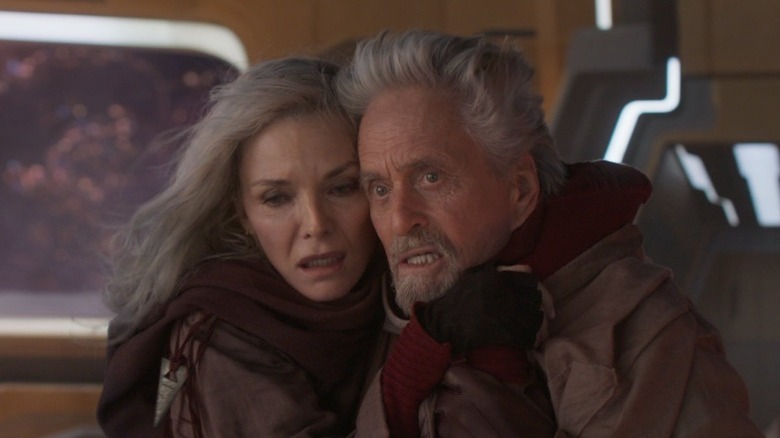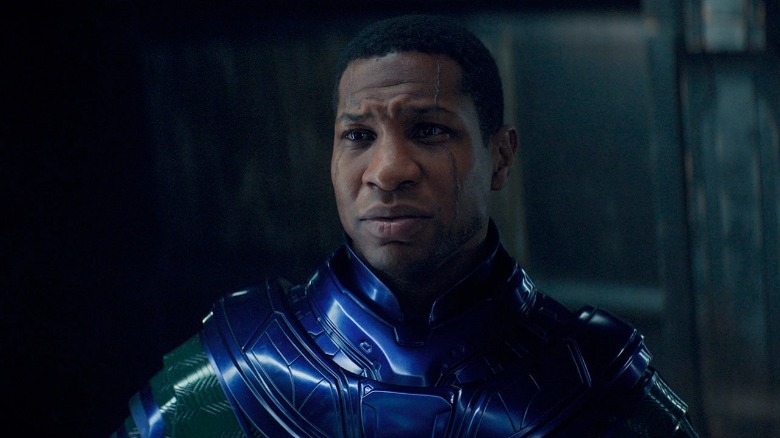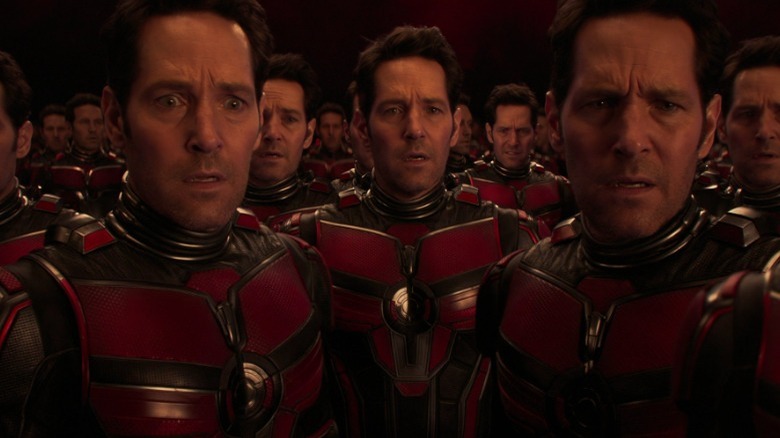Things Only Adults Notice In Ant-Man And The Wasp: Quantumania
This article contains spoilers for "Ant-Man and the Wasp: Quantumania."
"Ant-Man and the Wasp: Quantumania" is officially the 31st movie in the Marvel Cinematic Universe, released just short of 15 years after the first "Iron Man" in 2008. And with this installment, the Marvel movies and TV shows are now operating outside the interconnected realm of the Infinity Saga, and — like their comic book source material — the stories have become a much more unwieldy collection of alternate timelines and multiverses.
Overall, the films are good fun for audiences of all ages, from those who know every detail of the MCU and collate its differences from the comics like walking encyclopedias to those who just enjoy the movies and shows for their breezy, sci-fi escapism and an excuse to enjoy a day out at the theaters. Of course, all fans of all stripes must be willing to forgive the individual films for their continuity errors and variance in quality and suspend just the right amount of disbelief that the franchise tends to require. But with "Quantumania," like the rest of the MCU, it's all worth it to see where the various phases are going with these stories.
This is especially true for those audience members who might be a little longer in the tooth than others, as the film contains some fun references and innuendos that might slip by younger crowds. So, in the spirit of celebrating the more grown-up-oriented aspects of an otherwise family-friendly franchise entry, join us as we dive into the Quantum Realm to explore the things only adults will notice in "Ant-Man and the Wasp: Quantumania."
What is the Quantum Realm's deal?
The big draw in "Ant-Man and the Wasp: Quantumania" is the opportunity for audiences to spend most of the movie in the Quantum Realm, a subatomic world that we only glimpsed in the previous two "Ant-Man" movies. And while it's visually stunning — giving the movie a "Star Wars" vibe with exotic new forms of life and unique landscapes — it's not really explained how anything actually works there. We've been told on a few different occasions that the Quantum Realm "exists outside of space and time," but in practice, it's unclear what that actually means.
The mechanics of the Quantum Realm can be a little maddening to think too hard about, particularly given the contradictions. If it exists outside of the concept of space as we understand it, as we're told, then why is the larger plot of the movie concerned with a territorial dispute? If the exiled Kang the Conqueror (Jonathan Majors) is trying to take over, couldn't the other residents of the Quantum Realm just go somewhere else? Similarly, we know that time moves differently in the Quantum Realm — when Scott Lang (Paul Rudd) gets out at the beginning of "Avengers: Endgame," he's only spent five hours in the realm while five years have passed on Earth. Bizarrely, though, somehow time seems to operate pretty linearly in the Quantum Realm. Put simply, all of this will have some adults getting a bit of a lack-of-logic-induced headache, and any physics teachers in the crowd are bound to have some thoughts.
The Wasp still doesn't get much to do
Despite having graduated to co-lead billing in the title of the last two "Ant-Man" movies, Hope (Evangeline Lilly) still doesn't get a character arc to speak of in "Quantumania." Other than sort of vaguely sharing in the trust issues when she learns that her mother Janet (Michelle Pfeiffer) has left so much important information about the Quantum Realm unspoken, there's no internal conflict or interpersonal issue that she has to deal with or overcome, so her character development is next to nil.
Hope features heavily in all of the important action scenes of the movie, and a light rewrite could have given them some kind of character significance for her. During the "probability storm" surrounding Kang's broken power core, for example, Scott and Hope both see infinite versions of themselves, but Scott is the only one who sees himself as a Baskin-Robbins employee, indicating some kind of personal struggle with a path not taken. And it's Hope who bails Scott out during the final fistfight with Kang, but it would be much more satisfying if her coming back to save him paid off any sort of friction in their relationship. Title notwithstanding, the Wasp is kind of just along for the ride in "Quantumania."
After decades of a skewed gender ratio in the realm of superheroes, this bit of title tokenism really goes against Marvel's alleged goal of evening the MCU playing field and will probably result in some grown-up groans – and it's no wonder that Evangeline Lilly thinks it's time for a Wasp spin-off.
Hope's humanitarian work would be more interesting to see
One major missed opportunity to showcase the Wasp in a film bearing her name exists in her humanitarian work. Early in "Quantumania," Scott tells us that in the MCU's reality, Hope is busy making rapid, important changes to the world by using Pym particles for humanitarian aid. Adults in this reality — where no such technology exists and even those rapid advances we have seen still haven't solved most of the world's pressing problems — might wish they could just watch a whole movie about her charitable work.
Seeing her progress could be more cathartic to watch than what we get in the Quantum Realm, which is a decently entertaining but predictable sci-fi battle. It's good to know that Pym particles, which can literally change the distance between atoms, are being applied to things like reforestation and the worldwide food crisis instead of just shrinking or enlarging a random ex-convict. But much like Stark Industries' arc reactor, the good that Pym tech does for the world is all mostly offscreen.
A lazy feint at relevance
Speaking of the film's reluctance to showcase bigger issues... Your reasons for enjoying MCU movies might be different. Some people want to shut their minds off and not think about the world's problems when they go to the movies — every now and then, the MCU will address real-world problems, but it's usually more emotional and personal issues like grief and PTSD. "Ant-Man and the Wasp: Quantumania" initially seems like it's primed to dive into current, thorny issues, but it quickly retreats into the Quantum Realm and mostly leaves our world and its issues behind.
Early in the movie, Scott argues with his daughter Cassie (Kathryn Newton) about her recent arrest protesting the police clearing out an entire homeless encampment. She's used Pym particles to shrink an entire police car, but somehow still gets let out on bail. This might give the activist viewer hope that the "Ant-Man" franchise will earnestly tackle both homelessness in San Francisco as well as the militaristic police response to protestors, but before long it becomes clear that it's just the beginning of a much more abstract debate about helping people who need it. It's just another spin on the moral "with great power comes great responsibility" that the Spider-Man movies have long since run into the ground. Outside of "Black Panther" taking systemic racism and colonialism head-on, the MCU is, alas, still content to exist in its own, less controversial world.
The ooze is basically the babel fish from The Hitchhiker's Guide to the Galaxy
Like many science fiction franchises before it, "Ant-Man and the Wasp: Quantumania" has to find a way to explain how everyone speaks English in the Quantum Realm. And instead of burying a small detail about translator implants like in "Guardians of the Galaxy," the movie takes this challenge head-on and has our main characters drink "the ooze," a substance secreted from a creature named Veb (David Dastmalchian) that allows them to hear everyone's native language as English (and us in the audience as well, fortunately).
Well-seasoned adult fans of the genre can't help but be reminded of the babel fish, which serves a similar function in the book and movie "The Hitchhiker's Guide to the Galaxy." And while author Douglas Adams doesn't expressly own the concept of universal translation among species, the way that the ooze is comically presented as something just as gross and unsettling as it is helpful really traffics in the same territory, just with bodily fluids instead of a small fish in your ear. At the very least, it seems like it merits a self-aware reference from one of our several scientist characters, who would likely have had Adams' work as required reading at some point in the past. And that's not the only adult-friendly Easter egg...
I, for one, welcome our new ant overlords
Several aspects of the subplot about Hank's race of tech-savvy ants in "Quantumania" will remind seasoned viewers of the 1994 classic "Deep Space Homer," one of the all-time best episodes of "The Simpsons." Both stories feature an experimental ant farm that gets accidentally smashed. In "Quantumania" the ants get sucked into the Quantum Realm along with our heroes, somehow end up in a part of it where time flows faster, and evolve into a technologically advanced civilization of uber-ants that help save the day at the end of the movie.
In "Deep Space Homer," the ants just get loose on a space shuttle and cause some equipment to malfunction. But Springfield's local news anchor Kent Brockman (Harry Shearer), after getting a glimpse of a seemingly huge ant right in the shuttle's camera feed, immediately assumes that a race of giant space ants (not unlike the "Quantumania" ants) has taken the astronauts captive. His immediate surrender, throwing humanity under the bus and offering to help the ants recruit human slaves for their salt mines, is one of the funniest monologues in the hundreds of episodes of the classic cartoon. The parallels might be coincidental, but it's nice to see ant overlords finally get their day, and for those adults who grew up on "The Simpsons," there's accidental humor galore to be found in this part of the plot.
It looks like a higher-budget The Adventures of Sharkboy and Lavagirl
It would be one thing if the visual parallels between "Ant-Man and the Wasp: Quantumania" and Robert Rodriguez's bizarre kid's movie "The Adventures of Sharkboy and Lavagirl" were limited to MODOK (Corey Stoll) and Mr. Electric (George Lopez). The similarity of the villains, who are both essentially just floating heads with small purple limbs, is indeed striking, but that's only the tip of the iceberg. Plenty of eagle-eyed fans, likely grown-up Millenials that wonder if the 2005 movie was a strange dream they once had, have pointed out that both movies also have similar costumes, lighting, and constant CGI backgrounds.
It's kind of fun but also a little unsettling that "Quantumania," with the entirety of Marvel Studios behind it, turned out to be so similar to a movie on which Robert Rodriguez's then-eight-year-old son Racer received "story by" credit. In the end, the limitless potential of the Quantum Realm doesn't really have that much advantage over a child's imagination. "The Adventures of Sharkboy and Lavagirl," which has become a franchise in its own right, still has "Quantumania" beat in terms of unintentional comedy and dream-like plotting.
Baskin-Robbins agreed to very cynical product placement
With the advent of streaming making commercials less of a frequent presence in our lives than they used to be, it's natural for companies to turn to product placement perhaps to compensate. But Baskin-Robbins' recurring appearances in the "Ant-Man" movies seem kind of desperate. There's a gray area between being "in on the joke" and being the butt of it, and when you step back and consider the cynicism with which the ice cream chain is presented, it's kind of surprising that they agreed to lend their iconic purple and blue to the MCU.
In the first "Ant-Man," Scott is casually fired by his Baskin-Robbins manager Dale (Gregg Turkington), a moment mostly played for laughs despite highlighting some real difficulties that ex-convicts face in finding employment. Dale returns in "Quantumania" for a brief scene, in which we learn that Baskin-Robbins corporate has okayed the breathtakingly shameless move of naming Scott Lang "Employee of the Century" now that he's a world-saving Avenger. It's a solid joke about how soulless corporations generally are by nature, it's just weird that a corporation enthusiastically participated in it. (Interestingly, Chipotle was director Peyton Reed's first choice for the gag, but they declined. As Reed told USA Today, "Chipotle didn't particularly like the context in which we were using their brand.")
Janet and Hank are surprisingly open about needs
For better or for worse, the general tone of the MCU thus far has been defined to a large extent by the movies' eternal PG-13 ratings. There's mass death and genocide, but not much blood. There's intense violence and high stakes, but hardly anyone ever curses. And there are plenty of romantic pairings, replete with longing looks and tragic circumstances, but sex is all but non-existent and hardly ever discussed. However, Janet and Hank (Michael Douglas) have one brief and surprisingly frank exchange in "Quantumania" that feels more realistic than the single, tasteful love scene in "The Eternals" that only earned it an MPAA warning for "brief sexuality" or the cutesy innuendos contained in "WandaVision."
After some unmistakably loaded dialogue with Janet's former ally Lord Krylar (Bill Murray, eternally flirtatious), Janet admits that during her three decades in the Quantum Realm she of course had "needs." That particular euphemism might be a little over kids' heads, but adults know exactly what it means: No one ever refers to hand-holding or long walks on the beach as "needs" like that. This is all about her lack of sexual satisfaction. Hank, for his part, admits that he went on a few dates while Janet was missing, but nothing worked out. It seems a little improbable that they hadn't discussed any of this until this point, but the way it's handled is one of the most mature and relatable touches on sexuality in the MCU's long runtime.
Death no longer has meaning in the MCU
Regardless if you're on the Marvel or DC side of the rivalry, fans of mainstream comics will eventually have to make peace with a complexity that's unique to comic books. With the better part of a century of storytelling, characters have come back from the dead multiple times or been rebooted or reimagined for new series quite often over the years. To keep telling new stories about the same characters, but constantly deal with world-ending and life-or-death stakes, it's inevitable that death will kind of lose its meaning.
This is something adults that weren't well-versed in the eccentricities of comic books might be currently reckoning with about the MCU. While there have been a few major deaths that stand as absolute exceptions, plenty of characters have been resurrected or revisited in an alternate timeline, robbing each successive MCU death of its impact bit by bit. Sure, Iron Man actually dies in "Avengers: Endgame," but literally half the universe's population comes back to life with a single snap. Now, with the recent introduction of the multiverse and a potentially limitless number of character variants, the audience's patience for this will really be tested. We've already seen versions of Kang die twice, at the end of "Loki" and "Quantumania," so when he comes back in his thousands of other forms going forward, it's hard to know at this point what the stakes even are without the ultra-relatable (especially to adults) concept of mortality weighing so heavily on the storyline.
Is Scott telling himself or us not to think too hard?
The funniest moments in "Ant-Man and the Wasp: Quantumania" come to us via voice-over, when Scott is walking the streets of San Francisco at the beginning and end of the movie. In the closing scenes, he ponders the future and gets confused. Much like the Kang variant He Who Remains from the end of the "Loki" Disney+ series, the Kang that Scott defeats in the Quantum Realm claims that his demise will have disastrous consequences for everyone that Scott loves. Scott, his pleasant mood clearly waning on his face, wonders if he's actually doomed all of humanity instead of saving it this time.
But he shrugs off the thought, telling himself quite explicitly "don't think too hard" and goes to dinner with his family. Most MCU films don't rely too much on voiceover, so it's easy to take Scott's advice to himself as a tip for us, the audience. We're in Phase 5, the era of Kang the Conqueror and his many variants. Within minutes, non-expert viewers will be confused even further by a glimpse of the Council of Kangs in the mid-credits scene. At this point, after so many movies, timelines, and variants, "don't think too hard" is an unofficial motto for getting the most out of any particular MCU bit of content. Adult viewers might find their particular levels of disbelief suspension even more tapped out by this point.
